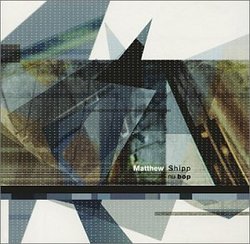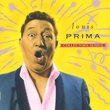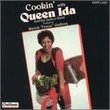| All Artists: Matthew Shipp Title: Nu Bop Members Wishing: 0 Total Copies: 0 Label: Thirsty Ear Original Release Date: 1/1/2002 Re-Release Date: 1/22/2002 Genres: Jazz, Pop Style: Avant Garde & Free Jazz Number of Discs: 1 SwapaCD Credits: 1 UPC: 700435711426 |
Search - Matthew Shipp :: Nu Bop
 | Matthew Shipp Nu Bop Genres: Jazz, Pop
Matthew Shipp's follow-up to the critically acclaimed, #1 CMJ jazz record, "New Orbit". Shipp set out to build a platform of acoustic and electronic rhythm figures to serve as a backdrop fora canvas of organic compositions... more » |
Larger Image |
CD DetailsSynopsis
Product Description Matthew Shipp's follow-up to the critically acclaimed, #1 CMJ jazz record, "New Orbit". Shipp set out to build a platform of acoustic and electronic rhythm figures to serve as a backdrop fora canvas of organic compositions based on improvisational impulses. "Matthew Shipp has this cinematic drama because of the way he keeps crunching and jarring the melody." - Herbie Hancock For more than a decade, Shipp has broken barriers and genre with his original style. In Nu Bop, he continues to challenge the limits and preconceptions of jazz with this explosive, beats-driven modern jazz recording. Bassist William Parker takes on the unusual role as funk meister. Reedman Daniel Carter turns in soaring performances that seem to defy gravity. And Guillermo E. Brown emerges by driving electronic beats with the best of modern drumming, thereby defining of new era of percussion. Interwoven into the fabric is Chris Flam's (DJ Spooky, A Guy Called Gerald) programming insights and deft editing skills. Throughout it all Shipp is still Shipp. Similarly Requested CDs
|
CD ReviewsNot Nu and Not Bop Christopher Forbes | Brooklyn,, NY | 04/22/2004 (1 out of 5 stars) "The problem with labels that are "artist run" is that often the artists are tempted to release material that just isn't ready for public consumption. Particularly if the "artist label" has the backing of a bigger company and major distribution the temptation to release too many albums can be rather great. This recording, released as part of Shipp's self-curated Blue series on Thirsty Ear, is a project that should never have seen pressing. The idea isn't bad, the compositions aren't bad, the individual playing isn't bad, but taken all together the album is an underdeveloped mess.I have had my struggles with Shipp as a musician. I've never been sure if my lack of enthusiasm for the pianist is real or the product of my own envy, as Shipp is my exact contemporary and plays my instrument (and is much more wildly successful than I am). In fact, concern about my own motives in accessing Shipp has kept me from reviewing any of his work until now, and from reviewing David S. Ware's CDs. I was afraid I would be unfair. However, I've come around to Shipp as a pianist, finding much more to admire in his chunky blend of 60s post-bop and avant-garde than I had first thought. And he has the good taste to surround himself with excellent musicians. This date is basically the David S. Ware rhythm section, with the addition of Daniel Carter on several cuts and programmer Chris FLAM. The attempt is to update the 60s avant-garde sound of the Ware group with heavy hip-hop beats, drum programming and post-production effects. This attempt fails, basically because Shipp and company don't adapt for the new style. Drum programming is locked in step. Jazz groups aren't. As a result, when Parker and Guillermo Brown mix up the funk rhythms, creating the kind of excitement one would expect from two groove masters, their natural deviations from the mechanical beat pull away from the drum programming. It's messy and effectively creates moments of anti-groove in music that is attempting to be groove music. When Miles Davis merged jazz with rock in the 70s he rethought both genres. The electronics weren't just tacked on to the old Miles Quintet sound. The sound itself adapted to the new medium. Similarly, when Miles added go-go and hip-hop sounds to his late groups he approached the music in an integrated fashion. This is exactly what Shipp and company doesn't do on this CD. The electronics remain an afterthought. Take them off the disc and you'd have a pretty standard Shipp CD, not much different from Pastoral Composure. The programming at best adds nothing to the CD and at worst gets in the way of the musicians. This is most obvious on the heavy hip-hop tracks, but even on Nu-Bop which features a heavily processed Daniel Carter, one can't help but ask what good any of the processing is doing to the overall group sound. The album isn't devoid of good spots. Shipp takes a lovely solo piano turn in ZX-1, though some of the processing effects can be a bit distracting. I'd much prefer to have heard the piano without so much artificial reverb and chorus effects. X-Ray is another Carter feature, this time on flute and without Shipp's piano. The piece is lovely, though again, the processing doesn't do much to help things. I'd rather hear Daniel without the delay. And many of the compositions are quite good, particularly D's Choice, which is one of the most engaging Shipp pieces I've heard. Unfortunately, the gimmicky program tracks mar it. Nu Abstract is the closest the CD gets to truly integrating the musical and electronic ideas. It's a spacey tone poem, featuring well though out programs based on Parker's bowed bass from FLAM as well as processed inside the piano effects from Shipp. But the good spots on the CD don't negate the impression of a work-in-progress that should have stayed in the can until the new elements were more thoroughly digested. All reports I've heard say that Shipp's later attempts at this jazz-electronica mix have been more successful and better integrated. I hope so. I will give them a listen, though maybe I will borrow them from someone first. Because if they aren't significantly more integrated more discs in this vein will be a complete waste of money.Not recommended." A work in progress Andrew Bisset | Marshall, VA USA | 03/24/2002 (4 out of 5 stars) "When I heard this album it blew me away. I've been searching a while now for good jazz fused with other styles of music. This disc is an exciting mix that brings an electronica flavor to the music. I give this cd only four stars though for a few reasons. First off, the CD is only 40 minutes long with most tunes lasting about 3 minutes. The other reason is that although the idea Shipp plays with here is a good one, it needs a little more development. The samples used in the first tune are cool but they don't really go anywhere and they are, in my opinion, the only real hip samples on the record. I feel like the other samples used were just kind of thrown together. Another problem which arises with any type of music that is based off of electronics is the limits it puts on spontanaeity. In the first cut there is a section where the drummer, Brown, comes out of a fill a little ahead of the time. In a natural jazz setting this subtle acceleration would hardly be noticed because the other musicians could support it. But the samples can't do that and so it comes out sounding out of time for a few beats. Despite the few shortcomings of this CD, I still suggest it. I feel like Shipp has uncovered something that will have a large influence on future developments of jazz. Just like any other jazz recording though, this album is an experiment. I feel Shipp has a little more experimenting to do and I therefore look forward to seeing what comes next. In the mean time I consider Nu Bop an important stepping stone into a new discovery of music." Needs more work Todd Adamson | 01/24/2002 (3 out of 5 stars) "Matthew Shipp is one of my favorite pianists. Last year's New Orbit was at the top of my list of best CDs of the year, so I had high hopes for this release. The album continues an electronic experiment that he started with David S. Ware on Corridors and Parallels, but unfortunately doesn't come off as well. Marrying Shipps dense percussive style with electronica seems like a no brainer, and on the opening track it is. Unfortunately, the majority of FLAM's programming seems to be an after thought that just gets in the way of Guillermo Brown's masterful funk drumming. One wonders what the likes of a Tom Jenkinson or Mike Paradinas could do with Shipp's compositions. Hopefully, Shipp will go back to the lab and continue experimenting, because despite this rather mixed affair you can see a foreshadowing of great things to come."
|

 Track Listings (9) - Disc #1
Track Listings (9) - Disc #1


